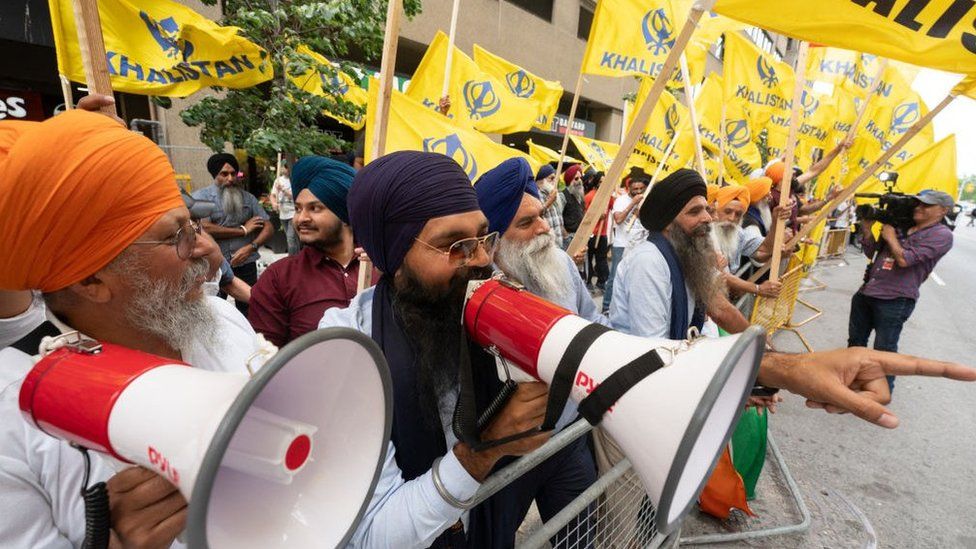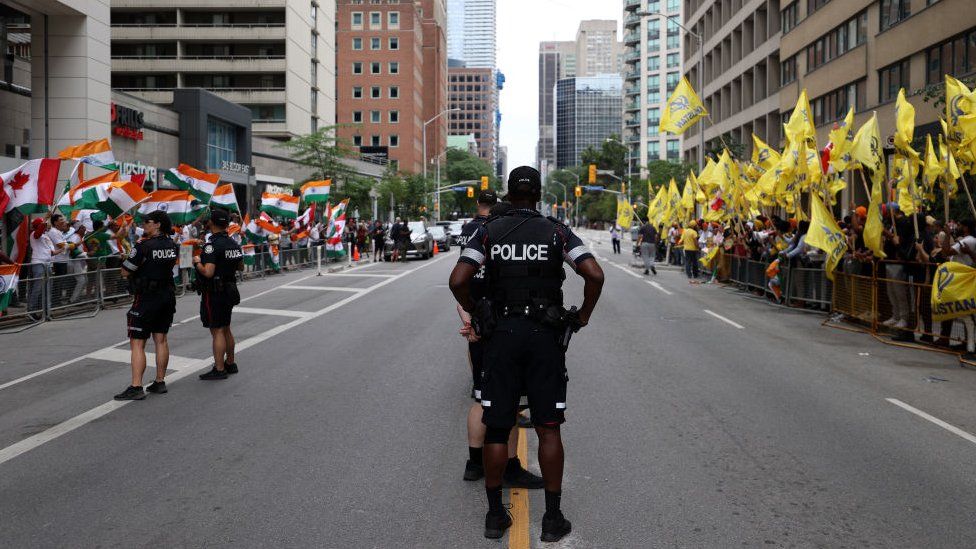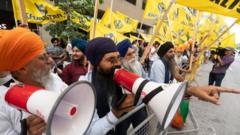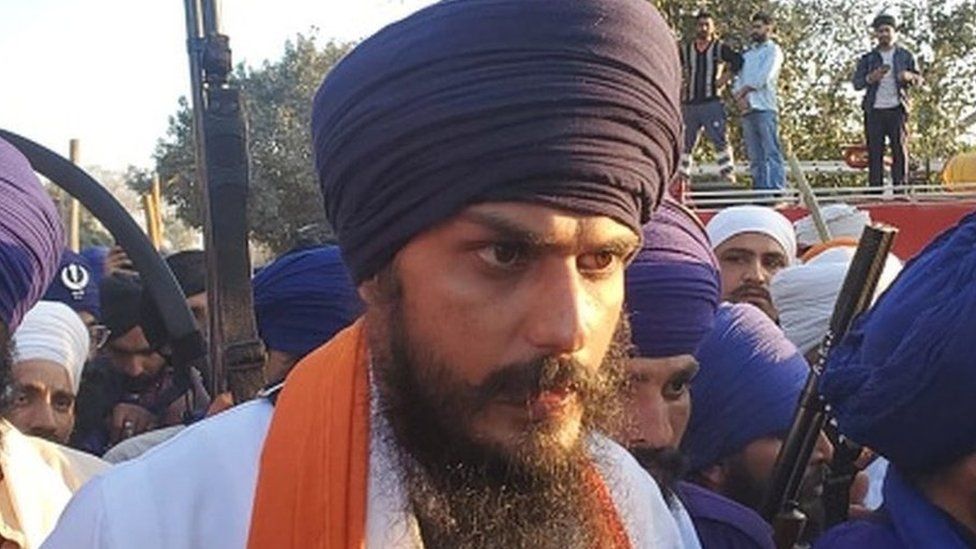
A prominent Sikh leader was brazenly murdered last month outside a temple in British Columbia (BC), Canada. The death has outraged his supporters and intensified global tensions between Sikh separatists and the Indian government.
On a mid-June summer evening in the busy parking lot of the Guru Nanak Sikh Gurdwara in the city of Surrey, Hardeep Singh Nijjar was shot dead in his truck by two masked gunmen.
A month later, the unsolved killing continues to reverberate, in Canada and across borders. Hundreds of Sikh separatists took to the streets in Toronto, along with a handful others in cities like London, Melbourne and San Francisco, just last weekend to protest the Indian government, which they believe is responsible for his death.
The Indian government has not commented on such allegations.
The outrage following the 45-year-old’s killing has brought to light a long-standing issue of some groups demanding a separate homeland for Sikhs, who are a religious minority that make up about 2% of India’s population.
The movement was at its peak in the 1980s in the state of Punjab, which witnessed several violent attacks and deaths. It lost steam after armed forces ran special operations against the movement – but supporters in the diaspora community continued their calls for a separate state, which have intensified in recent years.
India has strongly opposed the Khalistan movement. All mainstream political parties, including in Punjab, have denounced violence and separatism.
Mr Nijjar was a prominent Sikh leader in BC and a vocal backer of a separate Khalistani state. Supporters of his have said that he was a target of threats in the past because of his activism.
India said he was a terrorist and led a militant separatist group – accusations his supporters call “unfounded”.
Canadian investigators said they have yet to establish a motive for his murder or identify any suspects, but they have categorised the killing as a “targeted incident”.
Canada is home to the largest Sikh diaspora outside the state of Punjab. On 8 July, hundreds protested Mr Nijjar’s death in Toronto outside India’s High Consulate building. They were met with a smaller counter protest in support of the Indian government.
The two sides shouted at each other through barricades for several hours, and one pro-Khalistan demonstrator was arrested after attempting to breach the fence.
Even before the weekend, concerns had been raised about the protest.
Some posters for the Toronto event featured the words “Kill India” and labelled Indian diplomats in Canada as “killers”, leading the outraged Indian government to summon the Canadian envoy.

Balpreet Singh, the spokesperson for the World Sikh Organisation of Canada, said he believes the Khalistan movement has been somewhat dormant and largely peaceful in recent decades, though it has seen a revival, particularly among youth who did not live through the violence of the 1980s.
But even with this revival, there is a sense that people in Punjab have largely “moved on” from the idea of a separate state for Sikhs, said Gurpreet Singh, a BC-based journalist and radio host who has interviewed Mr Nijjar in the past.
“What we are seeing in Canada is a vocal minority of the Sikh community that is supporting Khalistan,” he said.
Mr Nijjar is the third prominent Sikh figure to have died suddenly in recent months.
In the UK, Avtar Singh Khanda, who was said to be the head of the Khalistan Liberation Force, died in Birmingham in June under what has been described as “mysterious circumstances” that some believe could be related to poisoning.
Paramjit Singh Panjwar, who was designated a terrorist by India, was shot dead in May in Lahore, the capital of Pakistan’s Punjab province.
Mr Singh, with the World Sikh Organisation, said Mr Nijjar had been the target of threats, and that he had warned members of the Canadian Security Intelligence Service as early as last summer that there was likely an assassination plot against the Sikh leader.
He said Mr Nijjar had been planning a non-binding referendum scheduled for September in Surrey on the question of an independent Sikh state, part of a global series of votes aimed at measuring consensus on the formation of Khalistan.
A similar referendum had taken place last year the city of Brampton, Ontario last year, which is home to around 160,000 Sikhs.
Results of the vote have not yet been released, but he said the turnout – an estimated 100,000 people – was met with anger from the Indian government.
“This was devastating to the Indian narrative that (Khalistan) is a fringe or extremist movement,” he said.
Following the referendum, India’s Ministry of External Affairs warned of a “sharp increase in incidents of hate crimes, sectarian violence and anti-India activities in Canada”, though it did not reference any specific incidents or make mention of the referendum.
There are differing narratives on the Khalistan movement in India, as well as the deaths of proponents like Mr Nijjar.
Some Indian commentators have pointed to internal rivalries between Sikh organisations in Canada as the reason behind Mr Nijjar’s death.
They have also accused Khalistan supporters in Canada of vandalising Hindu temples with “anti-India” graffiti and of attacking the offices of the Indian High Commission in Ottawa during a protest in March.
But Sikhs and some national security experts in Canada have accused the Indian government of spreading misinformation through its media to malign the Sikh community and supporters of a separate Khalistani state. India has denied this.
Canada’s national security adviser to the prime minister has previously accused India of being one of the top sources of foreign interference in Canada.
India, for its part, has argued that the rise of the Sikh separatist movement in Canada has interfered in India’s domestic affairs.
Despite this, both countries have long-standing diplomatic and trade ties and are in the advanced stage of talks to sign a landmark free-trade agreement. It is not clear whether the recent diplomatic tensions will have an impact on the deal.
Balpreet Singh said he believes Canada needs to take a stronger stance against foreign interference by India, arguing that it has mainly targeted the Sikh community.
But he added that Canada has also provided a place where many Sikhs who are supporters of the Khalistani movement can speak openly, and that the community remains defiant in the face of Mr Nijjar’s death.
“There is no one telling us we can’t talk about Khalistan here,” he said. “If you try to tell us we can’t talk about our sovereignty, we will do the very opposite.”
Related Topics
-
-
18 February 2014
-


